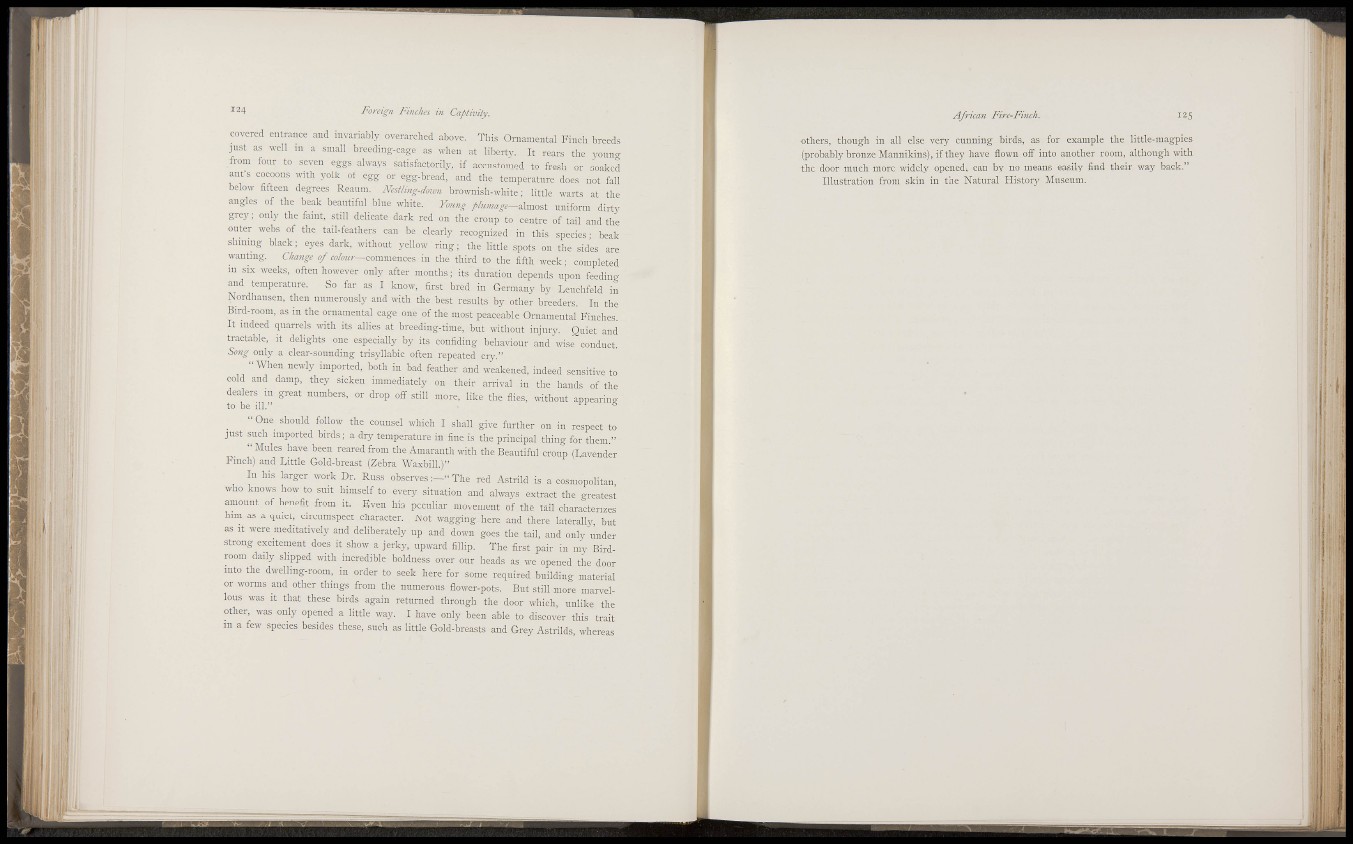
M.
124 Foreign Finchcs in Captivity.
covered entrance and invariably overarclied above. This Ornamental Finch breeds
jnst as well in a small breeding-cage as when at liberty. It rears the yonnofrom
fonr to seven eggs always satisfactorily, if accustomed to fresh or soaked
ant's cocoons with yolk of egg or egg-bread, and tlie temperature does not fall
belo^v fifteen degrees Reaum. Nedhng-domn brownish-white; little warts at the
angles of the beak beautiful blue white. Young //«.««».-almost uniform dirty
grey; only the faint, still delicate dark red on the croup to centre of tail and the
outer webs of the tail-feathers can be clearly recognized in this species- beak
shining black; eyes dark, without yellow ' r ing; the little spots on the sides are
wanting. Change of io/«/;—commences in the third to the fifth week; completed
in SIX Aveeks, often however only after months; its duration depends upon feedinoand
temperature. So far as I know, first bred in Germany bi' Leuchfeld in
Nordhausen, then numerously and with the best results by other breeders. In the
Bird-room, as in the ornamental cage one of the most peaceable Ornamental Finches
It indeed quarrels with its allies at breeding-time, but without injury. Quiet and
tractable, it delights one especially by its confiding behaviour and "wise conduct.
Song only a clear-sounding trisyllabic often repeated cry,"
"When newly imported, both in bad feather and weakened, indeed sensitive to
cold and damp, they sicken immediately on their arrival in the hands of the
dealers in great numbers, or drop off still more, like the flies, without appearing
to be ill." ^^ ®
" One should follow the counsel which I shall giye further on in respect to
just such imported birds ; a dry temperature in fine is the principal thing for them "
" Mules have been reared from the Amaranth with the Beautiful croup (Lavender
Finch) and Little Gold-breast (Zebra Waxbill.)"
In his larger work Dr. Rnss observes The red Astrild is a cosmopolitan
who knows how to suit himself to every situation and always extract the <.reatest
amount of benefit from it. Even his peculiar movement of the tail characterises
him as a quiet, circumspect character. Not wagging here and there laterally but
as It were meditatively and deliberately up and down goes the tail, and only under
strong excitement does it show a jerky, upward fillip. The first pair in my Birdroom
daily slipped with incredible boldness over our heads as we opened the door
into the dwelling-room, in order to seek here for some required building material
or worms and other things from the numerous flower-pots. But still more marvellous
was It that these birds again returned through the door which, unlike the
other, was only opened a little way. I have only been able to discover this trait
in a few species besides these, such as little Gold-breasts and Grey Astrilds, whereas
African Fire-Finch. 125
others, though in all else very cunning birds, as for example the little-magpies
(probably bronze Mannikins), if they have flown off into another room, although with
the door much more widely opened, can by no means easily find their way back."
Illustration from skin in the Natural Historj' Museum.
ii.
II [I I iii; 1
ili-ii
1:
Nr •it stg